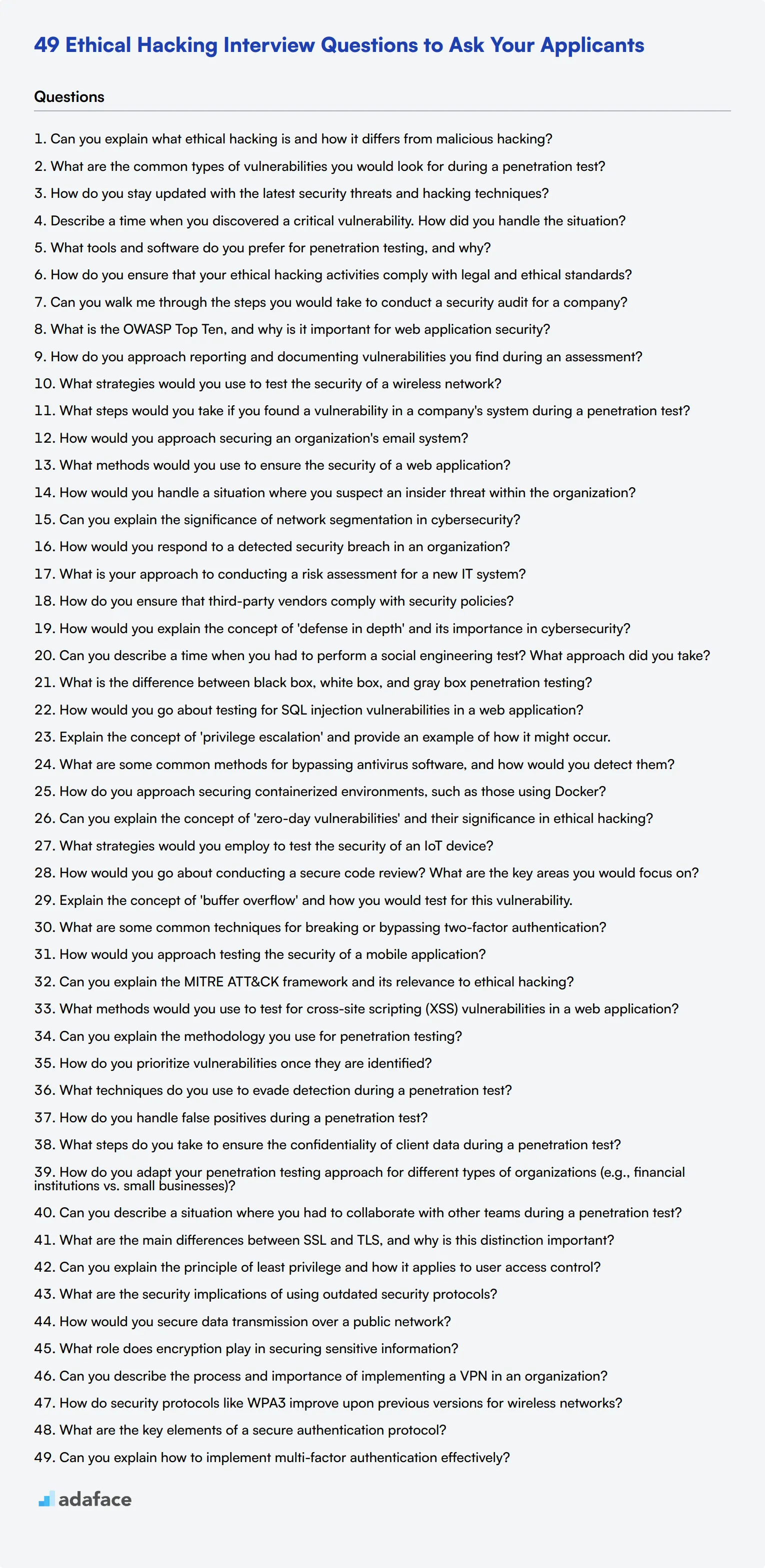Effective interviews are crucial for identifying the right candidates for your ethical hacking roles. Knowing which questions to ask can help you gauge an applicant’s technical skills and problem-solving abilities, saving you time and resources.
This blog post provides a comprehensive list of interview questions tailored for different experience levels in the ethical hacking domain. You'll find sections dedicated to junior security analysts, mid-tier hackers, penetration testing techniques, and security protocols.
By using these questions, you can better assess your candidates’ expertise and find the best fit for your organization. Additionally, consider pre-screening candidates with our ethical hacking test to streamline your hiring process.
Table of contents
10 common Ethical Hacking interview questions to ask your applicants
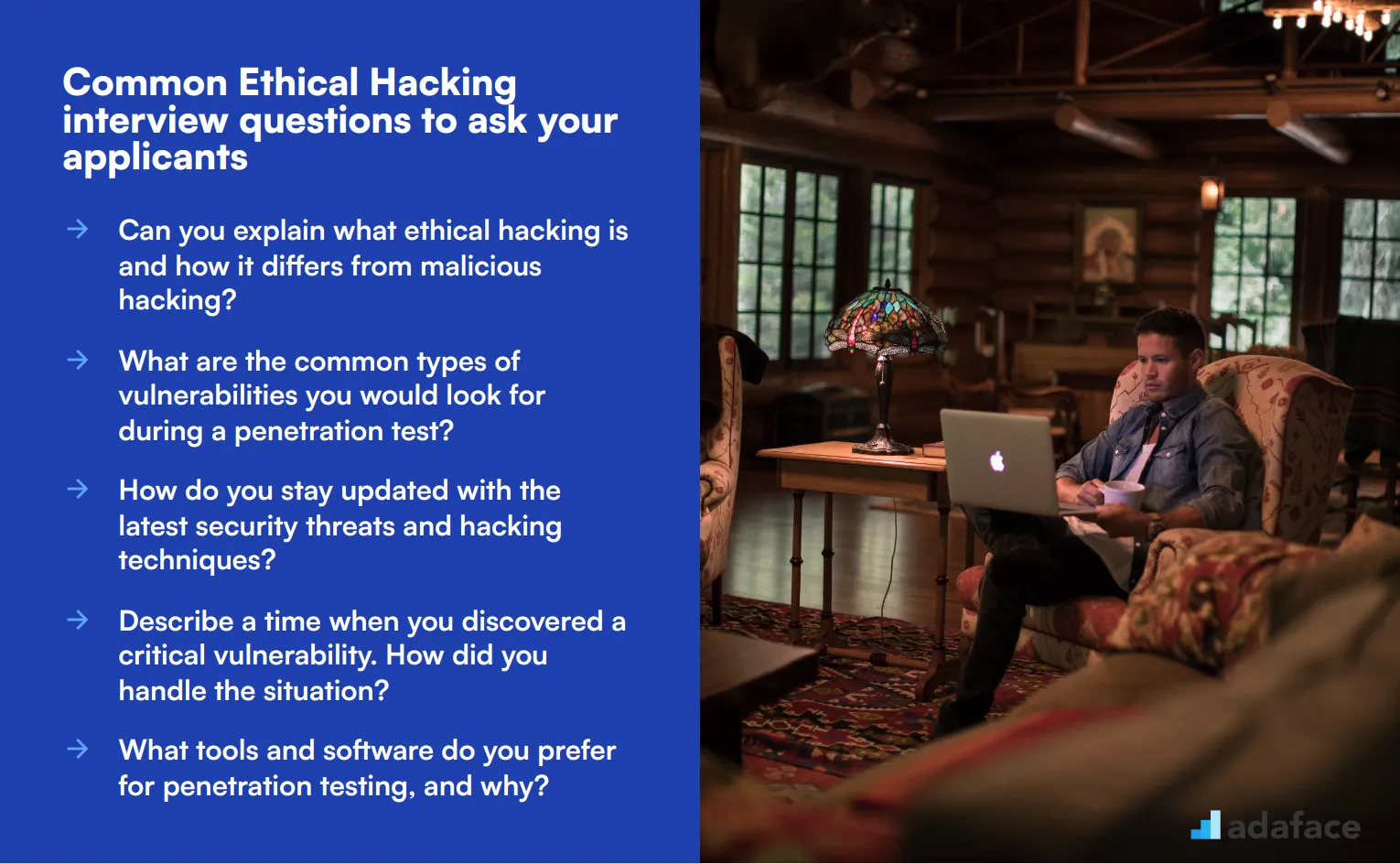
To determine whether your applicants possess the necessary skills and knowledge for ethical hacking roles, using a well-curated list of interview questions is essential. These questions can help you evaluate their technical expertise, problem-solving abilities, and practical experience in the field. For more information on the required skills for similar roles, visit this system security engineer job description.
- Can you explain what ethical hacking is and how it differs from malicious hacking?
- What are the common types of vulnerabilities you would look for during a penetration test?
- How do you stay updated with the latest security threats and hacking techniques?
- Describe a time when you discovered a critical vulnerability. How did you handle the situation?
- What tools and software do you prefer for penetration testing, and why?
- How do you ensure that your ethical hacking activities comply with legal and ethical standards?
- Can you walk me through the steps you would take to conduct a security audit for a company?
- What is the OWASP Top Ten, and why is it important for web application security?
- How do you approach reporting and documenting vulnerabilities you find during an assessment?
- What strategies would you use to test the security of a wireless network?
8 Ethical Hacking interview questions and answers to evaluate junior security analysts
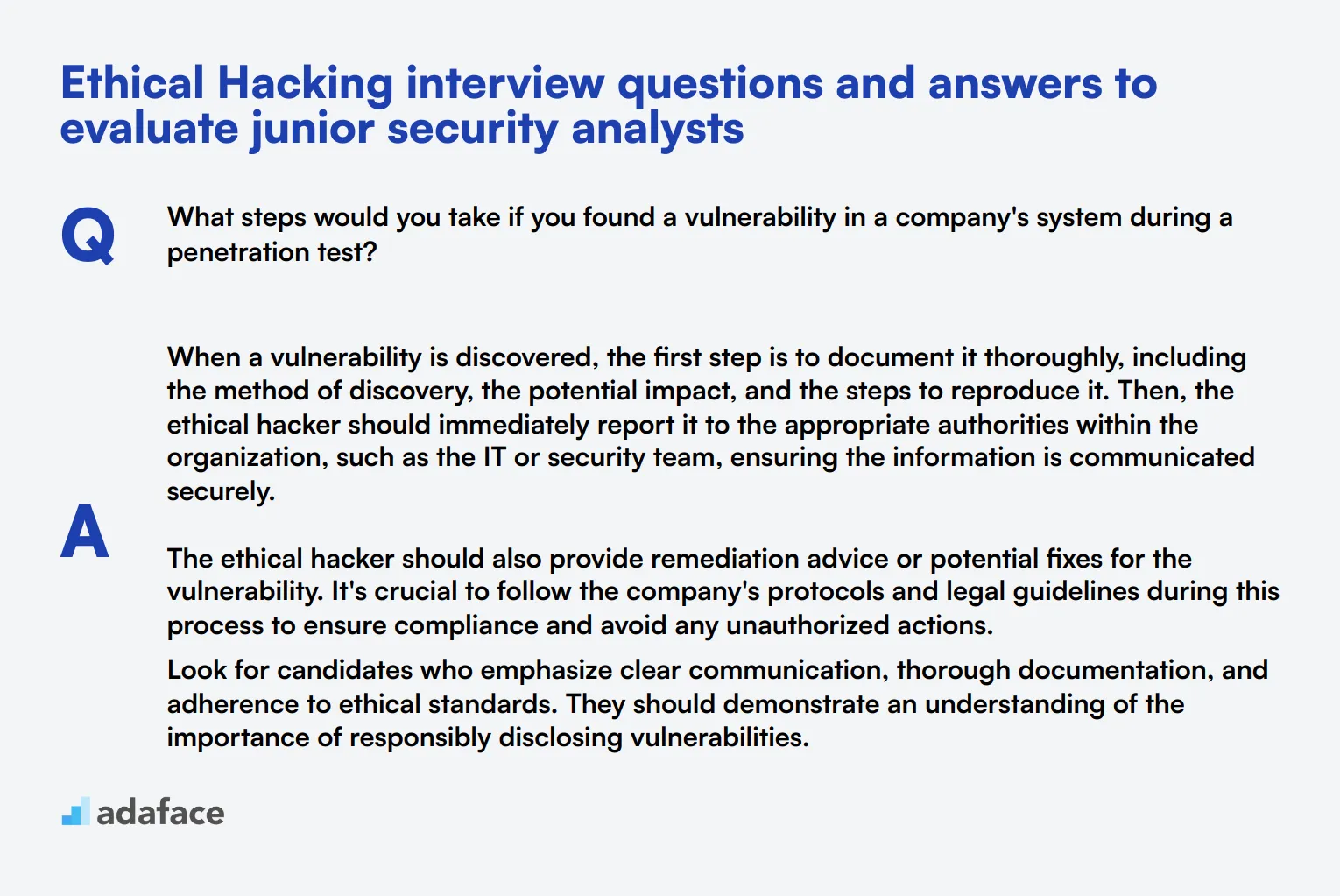
To determine whether your applicants have the foundational knowledge and analytical approach needed for ethical hacking, ask them some of these practical and insightful interview questions. These questions are designed to assess not just their technical skills, but also their problem-solving abilities and ethical considerations.
1. What steps would you take if you found a vulnerability in a company's system during a penetration test?
When a vulnerability is discovered, the first step is to document it thoroughly, including the method of discovery, the potential impact, and the steps to reproduce it. Then, the ethical hacker should immediately report it to the appropriate authorities within the organization, such as the IT or security team, ensuring the information is communicated securely.
The ethical hacker should also provide remediation advice or potential fixes for the vulnerability. It's crucial to follow the company's protocols and legal guidelines during this process to ensure compliance and avoid any unauthorized actions.
Look for candidates who emphasize clear communication, thorough documentation, and adherence to ethical standards. They should demonstrate an understanding of the importance of responsibly disclosing vulnerabilities.
2. How would you approach securing an organization's email system?
Securing an email system involves multiple layers of protection. Initially, implementing strong spam filters and malware detection to prevent malicious emails from reaching users is essential. Using email encryption to protect the content of emails and setting up multi-factor authentication (MFA) to secure access are also critical steps.
Regularly educating employees on recognizing phishing attempts and suspicious emails significantly enhances email security. Keeping the email system and its components up-to-date with the latest patches helps to mitigate any known vulnerabilities.
Ideal candidates will highlight both technical measures and user education as key components of email system security. They should show an understanding of the latest email security threats and best practices for mitigation.
3. What methods would you use to ensure the security of a web application?
Ensuring the security of a web application involves conducting regular security assessments, such as penetration testing and vulnerability scanning. Implementing secure coding practices and following frameworks like the OWASP Top Ten is fundamental to minimizing common vulnerabilities.
Using Web Application Firewalls (WAF) to filter and monitor HTTP requests, setting up proper authentication and authorization mechanisms, and ensuring data encryption in transit and at rest are also crucial steps. Regular updates and patches for the web application and its dependencies are necessary to protect against newly discovered vulnerabilities.
Candidates should mention a mix of proactive measures (like secure coding and regular assessments) and reactive measures (like WAFs and patching). They should demonstrate a comprehensive approach to web application security.
4. How would you handle a situation where you suspect an insider threat within the organization?
First, it is important to gather evidence discreetly and document any suspicious activities without alerting the potential insider threat. Using monitoring tools to track unusual behavior and access patterns can help in collecting this evidence.
Once sufficient evidence is gathered, reporting the findings to the appropriate internal authorities, such as the HR department or a security manager, is crucial. They can then take the necessary steps to investigate further and take appropriate action while ensuring the suspected individual’s rights are respected.
Look for candidates who emphasize discretion, thorough evidence collection, and following proper internal protocols. They should show an understanding of the delicate nature of insider threats and the importance of handling them professionally.
5. Can you explain the significance of network segmentation in cybersecurity?
Network segmentation involves dividing a network into smaller segments or subnetworks, each isolated from the others. This approach limits the spread of potential cyber threats, as an attacker gaining access to one segment cannot easily move laterally to others.
Segmentation can also enhance performance and simplify monitoring by grouping similar resources together. It allows for more granular control of security policies and can help in complying with regulatory requirements by isolating sensitive data.
Candidates should highlight both the security benefits and the operational advantages of network segmentation. They should provide examples of how segmentation can prevent the spread of attacks and improve overall network management.
6. How would you respond to a detected security breach in an organization?
Upon detecting a security breach, the initial response should be to contain the breach to prevent further damage. This may involve isolating affected systems, changing access credentials, and applying patches or updates to vulnerable systems.
After containing the breach, conducting a thorough investigation to understand how it occurred, what data was affected, and the extent of the damage is crucial. Communicating with relevant stakeholders, including management and potentially affected customers, is also necessary.
Look for candidates who emphasize a structured incident response plan, clear communication, and thorough investigation. They should demonstrate an understanding of both immediate containment actions and longer-term remediation strategies.
7. What is your approach to conducting a risk assessment for a new IT system?
Conducting a risk assessment starts with identifying and documenting all assets and their potential vulnerabilities. Next, evaluating the possible threats to these assets and the likelihood of these threats materializing is essential. Assessing the impact of each threat, in terms of both severity and likelihood, follows.
After identifying and evaluating the risks, prioritizing them based on their potential impact and developing mitigation strategies is the next step. This may involve implementing new security measures, updating existing ones, or even redesigning certain systems.
Candidates should demonstrate a methodical approach to risk assessment, emphasizing thorough documentation, prioritization, and proactive mitigation. They should also mention the importance of regular updates to the risk assessment as the IT environment evolves.
8. How do you ensure that third-party vendors comply with security policies?
Ensuring third-party vendors comply with security policies starts with clearly defining security requirements in the vendor contracts. This includes specifying the security standards and practices vendors must adhere to and the consequences of non-compliance.
Regularly auditing and assessing the security practices of third-party vendors through questionnaires, on-site inspections, and performance reviews is also crucial. Maintaining open communication channels with vendors for reporting and resolving any security issues promptly is essential.
Look for candidates who emphasize the importance of clear contractual agreements, regular assessments, and ongoing communication. They should demonstrate an understanding of the challenges of managing third-party risks and proactive strategies to address them.
15 intermediate Ethical Hacking interview questions and answers to ask mid-tier ethical hackers.
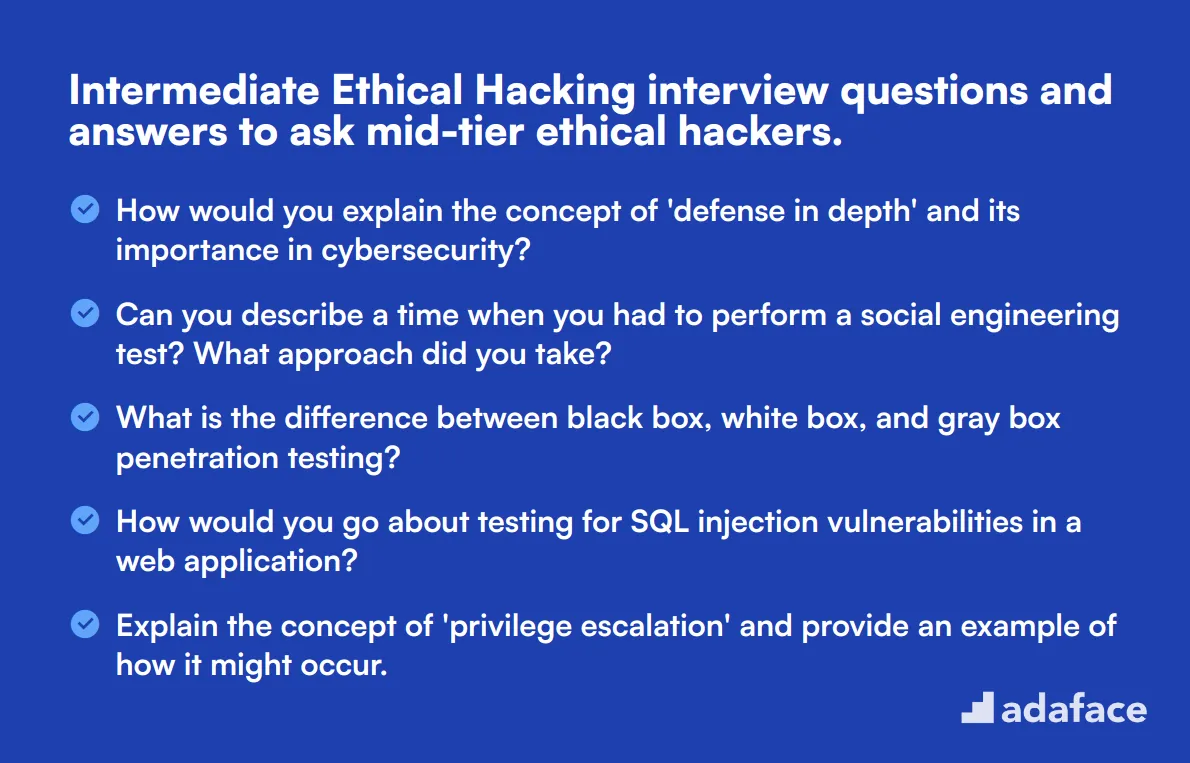
When interviewing mid-tier ethical hackers, it's crucial to assess their technical skills and practical experience. Use these 15 intermediate-level questions to evaluate candidates' understanding of advanced concepts and their ability to handle real-world security challenges.
- How would you explain the concept of 'defense in depth' and its importance in cybersecurity?
- Can you describe a time when you had to perform a social engineering test? What approach did you take?
- What is the difference between black box, white box, and gray box penetration testing?
- How would you go about testing for SQL injection vulnerabilities in a web application?
- Explain the concept of 'privilege escalation' and provide an example of how it might occur.
- What are some common methods for bypassing antivirus software, and how would you detect them?
- How do you approach securing containerized environments, such as those using Docker?
- Can you explain the concept of 'zero-day vulnerabilities' and their significance in ethical hacking?
- What strategies would you employ to test the security of an IoT device?
- How would you go about conducting a secure code review? What are the key areas you would focus on?
- Explain the concept of 'buffer overflow' and how you would test for this vulnerability.
- What are some common techniques for breaking or bypassing two-factor authentication?
- How would you approach testing the security of a mobile application?
- Can you explain the MITRE ATT&CK framework and its relevance to ethical hacking?
- What methods would you use to test for cross-site scripting (XSS) vulnerabilities in a web application?
7 Ethical Hacking interview questions and answers related to penetration testing techniques
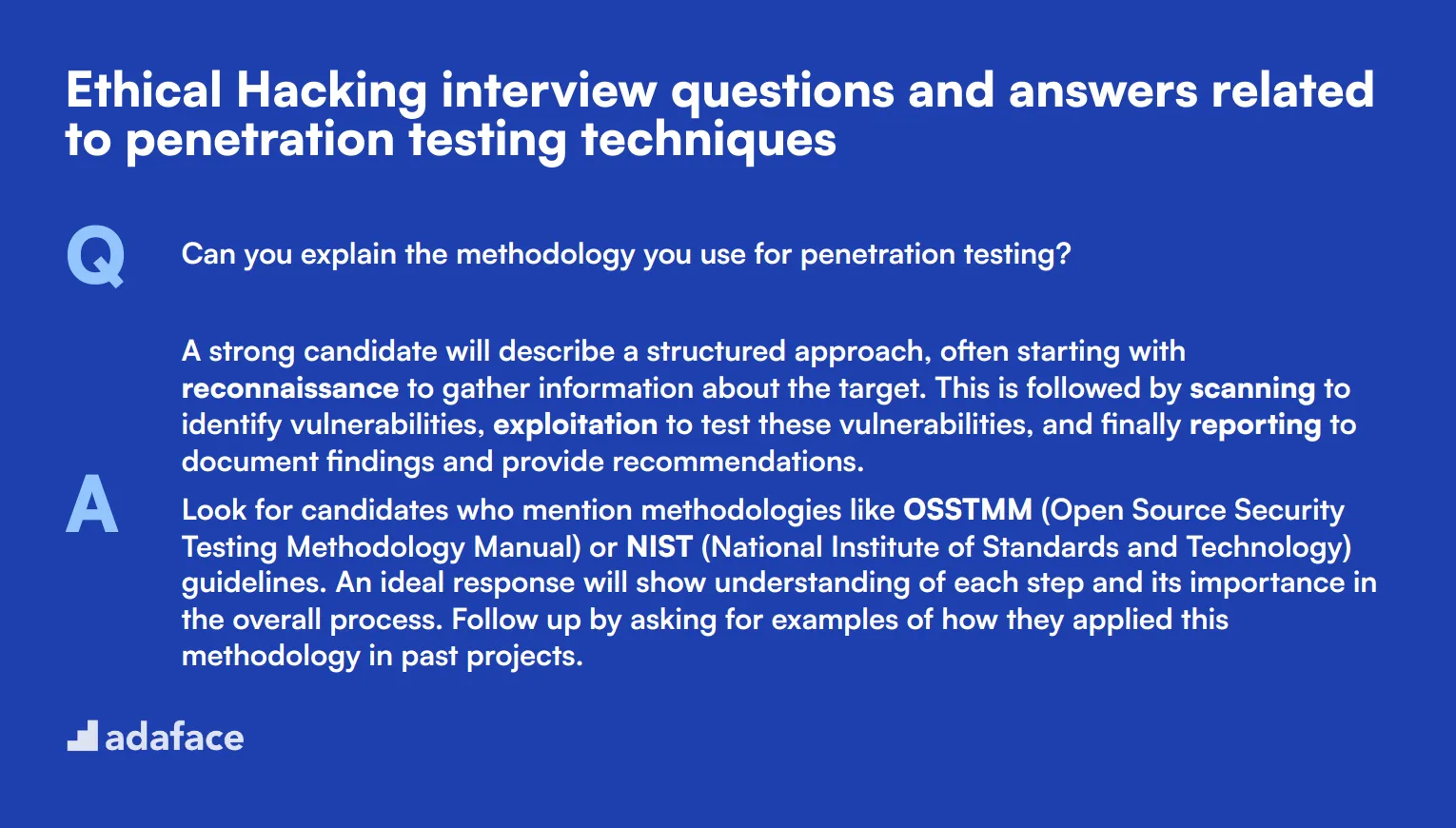
To assess whether candidates have the practical skills needed for penetration testing, use these tailored questions. They focus on real-world scenarios and techniques, ensuring you can gauge their hands-on experience and problem-solving abilities.
1. Can you explain the methodology you use for penetration testing?
A strong candidate will describe a structured approach, often starting with reconnaissance to gather information about the target. This is followed by scanning to identify vulnerabilities, exploitation to test these vulnerabilities, and finally reporting to document findings and provide recommendations.
Look for candidates who mention methodologies like OSSTMM (Open Source Security Testing Methodology Manual) or NIST (National Institute of Standards and Technology) guidelines. An ideal response will show understanding of each step and its importance in the overall process. Follow up by asking for examples of how they applied this methodology in past projects.
2. How do you prioritize vulnerabilities once they are identified?
Candidates should explain that prioritizing vulnerabilities typically involves assessing the severity, exploitability, and potential impact on the organization. They might mention tools like CVSS (Common Vulnerability Scoring System) to rate vulnerabilities.
Strong answers will also highlight the importance of context, such as the criticality of the affected systems and the potential business impact. Look for responses that demonstrate an ability to balance technical and business considerations effectively. Consider following up on how they communicated these priorities to stakeholders.
3. What techniques do you use to evade detection during a penetration test?
A well-rounded candidate will discuss techniques like using proxy servers, encrypted communication, and modifying attack patterns to avoid triggering alarms. They might also mention timing attacks to occur during less monitored periods or using zero-day exploits.
Look for candidates who can explain the ethical considerations and legal implications of these techniques. An ideal response should also include how they ensure that their actions are well-documented and within the scope of the agreed engagement. It might be helpful to refer to the skills required for a penetration testing expert.
4. How do you handle false positives during a penetration test?
Candidates should explain that false positives are identified through manual verification and cross-referencing with multiple tools. They may discuss techniques like re-testing vulnerabilities, consulting vendor documentation, and reviewing logs.
A good answer will also highlight the importance of maintaining accurate documentation and clear communication with the client. Look for responses that show a systematic approach to validation and emphasize minimizing disruption caused by false alarms. Follow up by asking for examples of how they handled false positives in previous roles.
5. What steps do you take to ensure the confidentiality of client data during a penetration test?
Candidates should describe measures such as non-disclosure agreements (NDAs), encrypted storage and transmission of data, and access controls to limit who can see the information. They might also discuss secure environments for analysis and regular audits of their processes.
Look for responses that demonstrate a strong understanding of privacy laws and best practices. An ideal candidate will emphasize a proactive approach to maintaining confidentiality and mention any certifications or training in data protection they have obtained. Consider following up by asking how they handle sensitive findings in their reports.
6. How do you adapt your penetration testing approach for different types of organizations (e.g., financial institutions vs. small businesses)?
A strong candidate will explain that the approach differs based on the organization's size, industry, and risk profile. For instance, financial institutions may require more rigorous testing due to regulatory requirements, while small businesses might need a more budget-conscious approach.
They should discuss tailoring their methodology to address specific threats relevant to the industry, such as compliance standards for financial institutions or resource constraints for small businesses. Look for answers that show flexibility and an understanding of the unique challenges each type of organization faces. Follow up by asking for specific examples of how they adapted their approach in different scenarios.
7. Can you describe a situation where you had to collaborate with other teams during a penetration test?
Candidates should provide an example where they worked with IT, development, or security teams to perform a penetration test. They might mention coordinating testing schedules, sharing findings, and collaborating on remediation efforts.
Look for responses that highlight strong communication skills and the ability to work well in a team. An ideal answer will show how the candidate facilitated a smooth process and achieved the desired outcomes through effective collaboration. Follow up by asking how they handled any challenges or conflicts that arose during the collaboration.
9 Ethical Hacking interview questions about security protocols
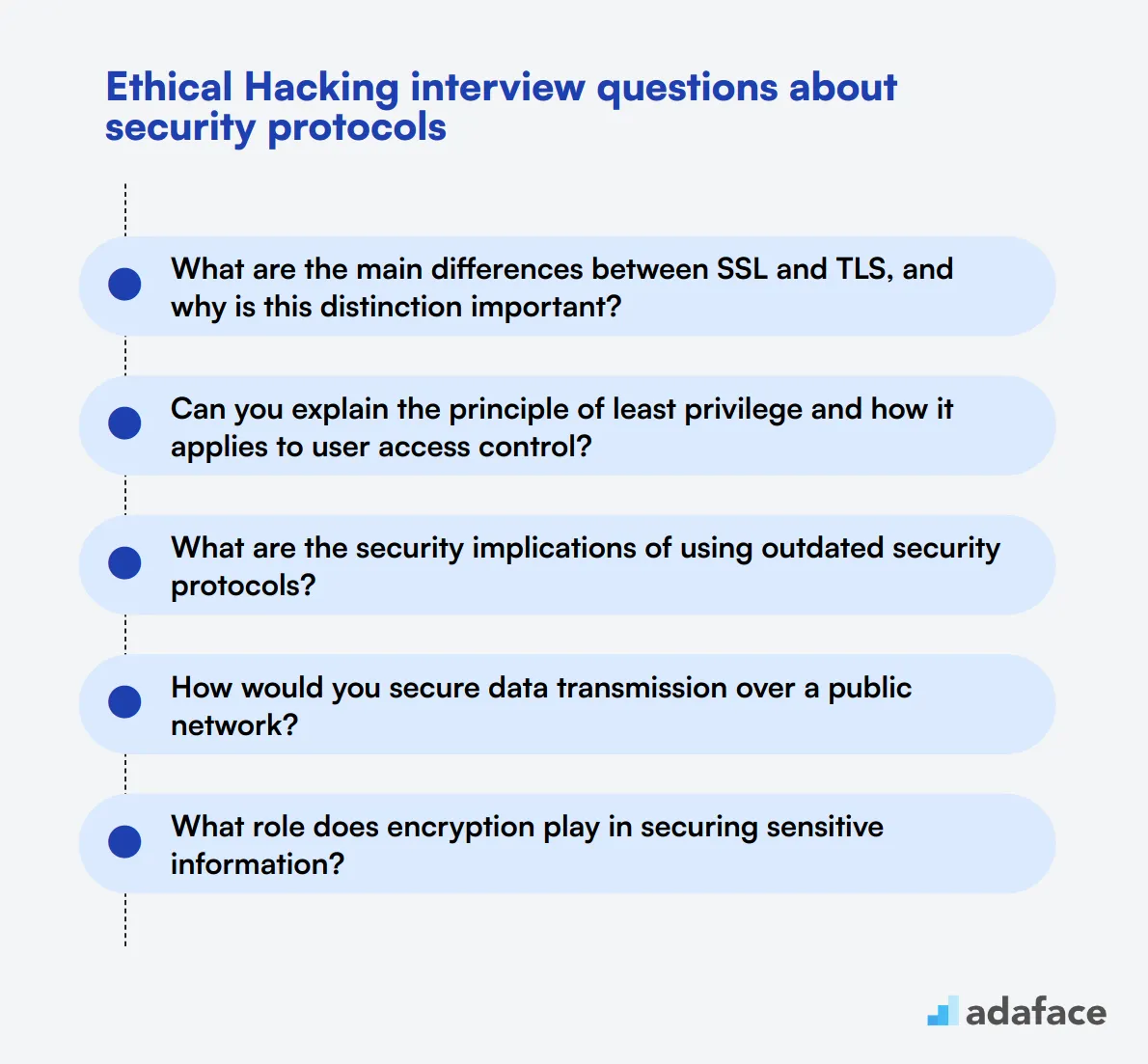
To assess whether your candidates are well-versed in important security protocols, utilize these interview questions. They are designed to evaluate both theoretical knowledge and practical skills relevant to roles such as a penetration testing expert.
- What are the main differences between SSL and TLS, and why is this distinction important?
- Can you explain the principle of least privilege and how it applies to user access control?
- What are the security implications of using outdated security protocols?
- How would you secure data transmission over a public network?
- What role does encryption play in securing sensitive information?
- Can you describe the process and importance of implementing a VPN in an organization?
- How do security protocols like WPA3 improve upon previous versions for wireless networks?
- What are the key elements of a secure authentication protocol?
- Can you explain how to implement multi-factor authentication effectively?
Which Ethical Hacking skills should you evaluate during the interview phase?
While it's impossible to assess every aspect of a candidate in a single interview, focusing on key ethical hacking skills can provide valuable insights. Evaluating these core competencies is vital to ensuring that the candidate is suited for the challenges of ethical hacking roles.
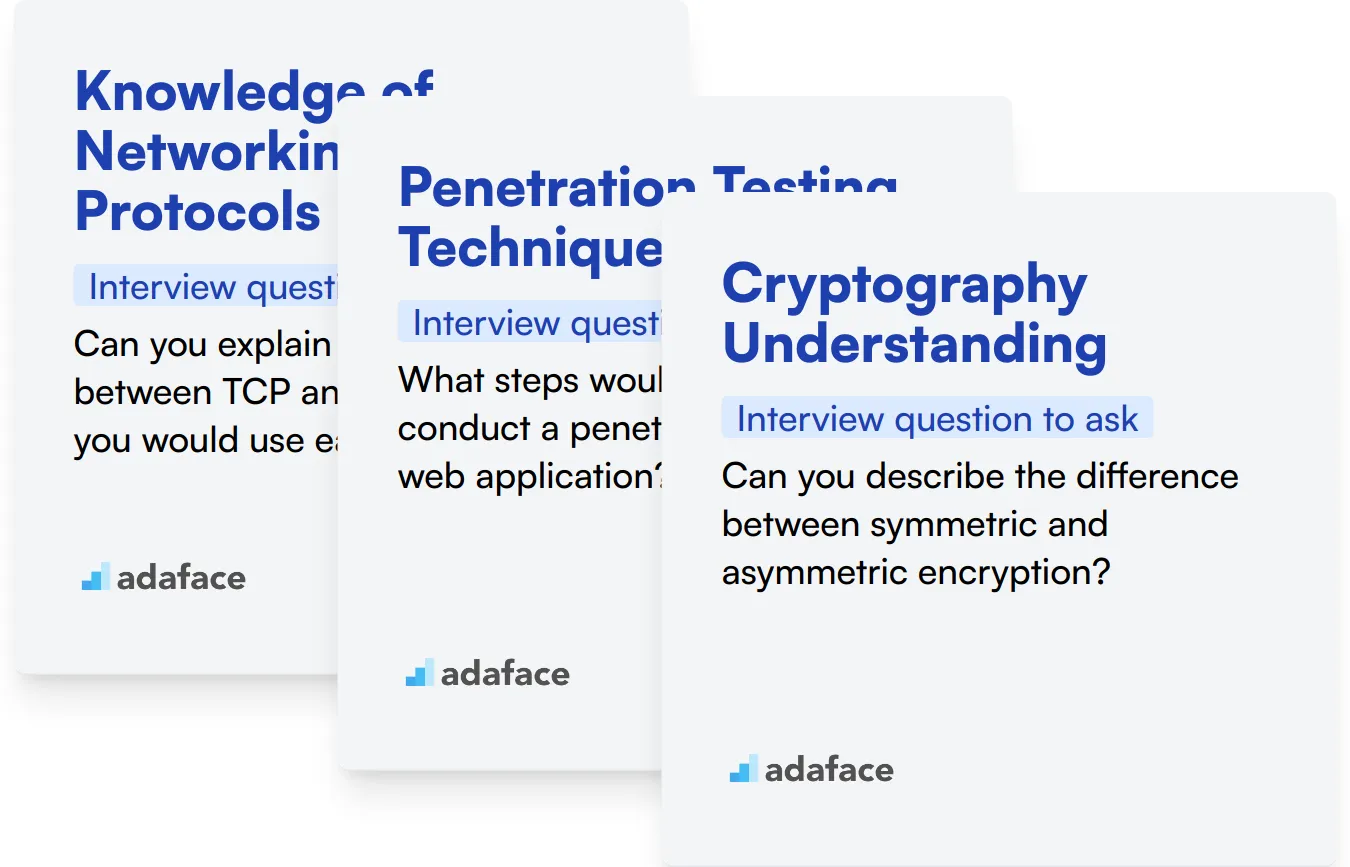
Knowledge of Networking Protocols
To filter candidates effectively, consider using an assessment test that includes relevant MCQs on networking protocols. You can find a suitable test in our library: Computer Networks.
In addition to the assessment, asking targeted interview questions can further gauge a candidate's understanding of networking protocols.
Can you explain the difference between TCP and UDP and when you would use each?
Look for a candidate who can clearly articulate the differences, including the connection-oriented nature of TCP versus the connectionless approach of UDP. Their understanding should reflect real-world applications and scenarios in which they would choose one protocol over the other.
Penetration Testing Techniques
Utilizing an assessment test featuring MCQs on penetration testing techniques can help streamline the selection process. Our library offers a relevant test: [Penetration Testing](https://www.adaface.com/assessment-test/penetration-testing-test.
Beyond assessments, consider asking specific interview questions about penetration testing to assess a candidate's practical knowledge.
What steps would you take to conduct a penetration test on a web application?
Pay attention to their approach, including reconnaissance, scanning, gaining access, and reporting. A well-rounded answer should demonstrate both theoretical knowledge and practical application of penetration testing methodologies.
Cryptography Understanding
Consider using an assessment test that includes MCQs on cryptography concepts to evaluate this skill effectively. Check out our Cryptography test.
Asking targeted questions about cryptography during the interview can help gauge a candidate’s depth of knowledge.
Can you describe the difference between symmetric and asymmetric encryption?
Look for a candidate who can explain the key differences, such as key usage and security implications. Their ability to provide examples of when to use each type will further indicate their practical understanding.
3 Tips for Effectively Using Ethical Hacking Interview Questions
Before you start applying what you've learned, here are some tips to enhance your interviewing process. These strategies will help you make the most out of your ethical hacking interview questions.
1. Incorporate Skills Tests Before Interviews
Using skills tests before interviews can significantly improve your candidate evaluation process. These assessments provide a clear indication of a candidate's practical abilities, ensuring they possess the necessary technical skills for the role.
Consider utilizing tests such as the Ethical Hacking Test or the Penetration Testing Test to assess candidates' expertise in critical areas. This not only filters candidates based on their skills but also makes your interview process more efficient.
By integrating skills tests into your hiring workflow, you can reduce the time spent interviewing unqualified candidates, allowing you to focus on those who meet your criteria. This approach sets a strong foundation for the subsequent interview stages.
2. Compile Targeted Interview Questions
Time is limited during interviews, so it's essential to compile a focused set of questions that assess key skills and knowledge. Selecting relevant questions maximizes your chances of evaluating candidates effectively across important subskills.
In addition to your ethical hacking questions, you might want to include competency questions related to communication or problem-solving. Referencing other skill-related topics, such as Cyber Security or Network Engineering, can provide valuable insights into a candidate's overall capabilities.
Tailoring your question set not only saves time but also enhances the quality of your assessment, allowing you to identify candidates who align best with your team's needs.
3. Don't Forget to Ask Follow-Up Questions
Simply asking interview questions is not enough; follow-up questions are essential for uncovering deeper insights into a candidate's abilities. Candidates might provide surface-level answers that don't truly reflect their expertise or thought processes.
For example, if you ask, 'Can you explain a recent ethical hacking project you worked on?' a good follow-up question could be, 'What specific challenges did you face during that project, and how did you overcome them?' This encourages the candidate to provide more in-depth responses, helping you gauge their problem-solving skills and real-world experience.
Leveraging Skill Tests to Streamline Hiring of Ethical Hackers
To ensure candidates possess the necessary ethical hacking skills, it's crucial to verify these competencies accurately. The most straightforward way to achieve this is through targeted skill tests. Consider utilizing tests such as our Ethical Hacking Test, Penetration Testing Test, or Cyber Security Test to assess these critical skills effectively.
After administering these tests, you can confidently shortlist the top candidates for interviews. For further steps in the hiring process, direct your efforts to our signup page or explore more about our offerings on the online assessment platform page to enhance your hiring strategy.
Ethical Hacking Test
Download Ethical Hacking interview questions template in multiple formats
Ethical Hacking Interview Questions FAQs
Ethical hacking involves legally breaking into computers and devices to test a company's defenses. It's a crucial part of cybersecurity.
They help assess the candidate’s practical skills and theoretical knowledge, ensuring they are fit for the role in your organization.
A strong understanding of networking, programming, security protocols, penetration testing, and problem-solving skills are essential.
Skill tests provide a practical assessment of a candidate's abilities, which, combined with interview questions, give a holistic view of their competencies.
Common tools include Nmap, Wireshark, Metasploit, Burp Suite, and Nessus. Proficiency with these tools is often assessed in interviews.
Cybersecurity is a rapidly evolving field; hence, continuous learning and staying updated with the latest trends and threats is necessary.

40 min skill tests.
No trick questions.
Accurate shortlisting.
We make it easy for you to find the best candidates in your pipeline with a 40 min skills test.
Try for freeRelated posts
Free resources




